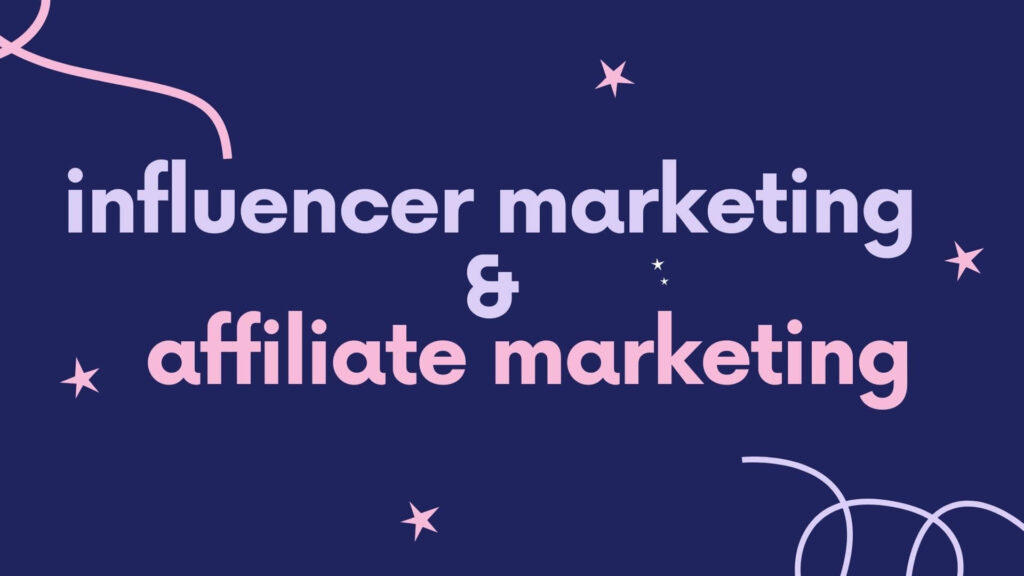Affiliate marketing and influencer marketing are two popular strategies for online businesses. But they are different.

Key takeaways
| Affiliate Marketing | Influencer Marketing | |
| Definition | A performance-based marketing strategy where individuals (affiliates) earn a commission for driving sales or leads to a company. | Collaboration between brands and individuals who have a significant following and influence in a specific niche or industry. |
| Brand desired result | Measurable conversions, such as sales or leads. | Brand awareness |
| Earning | Affiliates earn commissions based on sales or leads generated through their unique affiliate links. | Influencers earn through various avenues, including flare fees, sponsored products, and sponsored content, and may not always be tied to sales. |
About Affiliate Marketing?
Affiliate marketing become a part of the digital marketing game since the 1990s when eCommerce was just thriving.
Why does affiliate marketing stand out? Well, simply because it is performance-based, which means it is all about getting paid for actual results, mainly sales.
That’s a relief for everyone’s wallets!
Affiliate marketing appeals to businesses because it is super effective in terms of investment.
Stat does not lie: 80% of companies deploy affiliate marketing and the Return on Investment (ROI) rate is 1,200% for US businesses in 2021.
Affiliate marketing is still the trend. Global spending on it is expected to hit $15.7 billion in 2024, according to Marketing Hub.
How does it work?
In affiliate marketing, there are three main actors involved: the affiliate, the merchant, and the customer. Here is a simple explanation of how it works.
- The brand, seeking sales, provides affiliates with a link called an affiliate link.
- Affiliate embeds the link on their promotional efforts, such as a blog post.
- The customer discovers a product and clicks on their unique tracking link.
- When the customer purchases through the link, the affiliate earns a commission.
This model benefits all parties—the customer finds products through trusted recommendations, the brand gains sales, and the affiliate earns commissions for successful conversions. Everybody loves affiliate marketing because it is a mutually beneficial strategy in the e-commerce industry.
Who are affiliates?
- Unattached Affiliate Marketing: Affiliates don’t have a personal connection with the products. They simply apply some marketing techniques, such as using ads on Google, Facebook, or other websites to get people to click on links and buy things.
- Related Affiliate Marketing: Others, like a fitness blogger, talk about health and fitness. They put links to fitness stuff in their posts. Even if they don’t use the products, these products are related to what they talk about and what their audience likes.
- Involved Affiliate Marketing: Then, there are affiliates who really use and know the products. For instance, a beauty vlogger uses a makeup brand every day. Because she genuinely saw improvement with it, people trusted her recommendations more. Simply like sharing a personal experience with your friends.
Side information: Affiliates, who are bloggers drive a massive 65% of affiliate sales, even with all the new content trends like TikTok videos and Instagram reels booming.
Example of Affiliate Marketing
TikTok has a special thing called the TikTok For Business Affiliate Program.
If you join, and you bring in new people to use TikTok For Business, you can earn some money. Digital marketing experts and TikTok users with a lot of followers who can talk to TikTok users can join. The program gives you chances to make sponsored posts, use affiliate programs, and get free stuff.
To reach out to people and promote products, you can make cool videos or even use ads to reach more audiences. You can also share your special links on your website or social media to get more people interested. It’s a way to earn something extra by simply promoting TikTok Business.
See more: Affiliate Marketing vs Referral Marketing – The differences

About Influencer Marketing
Influencer marketing has been around even before the Internet.
But now, with social media booming of platforms such as TikTok or Facebook, influencer marketing has becoming a big deal. You can check out platforms where come affiliate influencers.
How does influencer marketing work?
It’s when companies collab with people with a lot of followers (influencers) to talk about their products. These influencers are like messengers for the brands. They can do all sorts of things to get the word out, like shoutouts, giveaways, taking over social media accounts, or making sponsored posts. Sometimes, influencers also use special links and get money when people buy something through those links.
About 61% of audiences seriously thinking about buying products depends on what an influencer recommends. The cool thing is that influencers are usually experts in what they talk about, so people trust them.
Types of influencers
Plus, when brands team up with smaller influencers, like nano and micro-influencers, they do even better at selling stuff because they can connect with specific groups of people more effectively.
- Mega-Influencers (Over 1 million followers): A-level stars (like Kanye West), major industry figures, and widely recognized personalities.
- Macro-Influencers: (Between 100,000 and 1 million): Well-known experts in their field, established bloggers, or personalities with a significant online presence.
- Micro-Influencers (Between 10,000 and 100,000): individuals with a more niche focus, often with a highly engaged and dedicated audience.
- Nano-Influencers (Fewer than 10,000 followers): Individuals with a small but tight-knit community, often having a strong influence on a specific local or niche audience. Collaboration with Nano-Influencers is sometimes called KOL marketing.
Technically, an influencer can be an affiliate at the same time (they are called affiliate influencers) if the agreement with the brand allows them to earn commission from successful orders placed via special links or coupons.
See more: Digital Marketing vs Affiliate Marketing: A Comparision
Examples of Influencer Marketing
SKIMS, a brand specializing in shapewear founded by Kim Kardashian, has reached a $4 billion valuation since its 2019 establishment.
Skims has an influencer program that allows social media influencers to promote the brand’s products to their followers. The benefits of joining the Skims influencer program include sponsored posts, affiliate programs, and free goodies.
SKIMS strategically leverages micro and macro influencers on Instagram, focusing on authentic, high-quality content. The brand’s emphasis on Instagram is evident from its 5.3 million followers.
Micro/Macro Influencers: SKIMS collaborates with a variety of influencers, emphasizing a diverse range of follower counts.
At this point, SKIMS has generated an estimated media value of €5.1 million through posts and €9.4 million through Instagram stories, showcasing the efficacy of the story format.

07 key differences between affiliate marketing and influencer marketing
| Influencer Marketing | Affiliate Marketing | |
| Personal endorsement | Relies on influencers who promote a product or service to their audience (typically on their own experiences and preferences) | Involves affiliates promoting products or services via unique affiliate links (typically) without a personal endorsement. |
| Content creation | Focuses on the influencers creating unique and engaging content to showcase the promoted product or service in a more personalized manner. | Typically relies on affiliates using pre-made promotional materials provided by the brand or merchant. |
| Relationship with audience | Leverages the trust and relationship influencers have built with their audience over time, creating a more genuine connection. | This may not necessarily involve a direct relationship between the affiliate and the audience |
| Payment structure | Influencers get paid a flat fee in advance, receive free products, and can negotiate payout with the brand. | Affiliates earn a fixed commission based on the sales or actions generated through their unique affiliate links. |
| Brand Control | Brands have full control over the content created by influencers. However, the content still needs to align with their creativity and style to promote the product. | Brands have little control over how affiliate promote their products. However, they still have strict terms and conditions regarding the promotional materials and messaging used by affiliates. |
| Brand partners | Influencers of various audience sizes, including nano, micro, macro, and mega influencers. | Typically involves an affiliate network from which the brand can find individuals, bloggers, websites, and other types of affiliates. |
| Brand relationship with partners | Often focuses on building long-term relationships between the influencer and the brand, with campaigns extending over an extended period. | It is not necessarily for a brand to build a long-term relationship with an affiliate. |
In summary, the main difference between influencer marketing and affiliate marketing is that influencer marketing focuses on increasing brand awareness and reaching a wider audience, while affiliate marketing is focused on driving sales and increasing revenue for the business.
Affiliate marketing vs influencer marketing: Which one is more expensive?
Affiliate marketing costs less and is low-risk since you pay only for results like sales or leads. Influencer marketing costs more, with fixed fees for posts or campaigns, ranging from $100 to $10,000+. While affiliate marketing focuses on performance, influencer marketing can boost brand awareness quickly but doesn’t guarantee results.
Here is the detail breakdown:
Affiliate Marketing Costs
- Payment: Based on performance, such as sales or leads (commission percentage).
- Risk: Low, as you pay only for results.
- Tools: Affiliate platforms or apps for tracking and management ($20–$200/month).
Influencer Marketing Costs
- Payment: Fixed fees per post, campaign, or content creation (can range from $100 to $10,000+ depending on follower count).
- Risk: Higher, as results aren’t guaranteed.
- Tools: Optional platforms for finding influencers (varied costs).
Key Takeaway
Affiliate marketing is more cost-effective and low-risk since you pay for results. Influencer marketing often has higher upfront costs but can quickly boost brand awareness.
Conclusion: What to choose?
In short, the choice need not be binary. Simultaneously deploying affiliate and influencer marketing campaigns can amplify the impact, creating a synergistic marketing approach.
BixGrow, an affiliate management platform, exemplifies this dual-strategy success, connecting over 6,000 global Shopify brands with adept content creators and influencers.